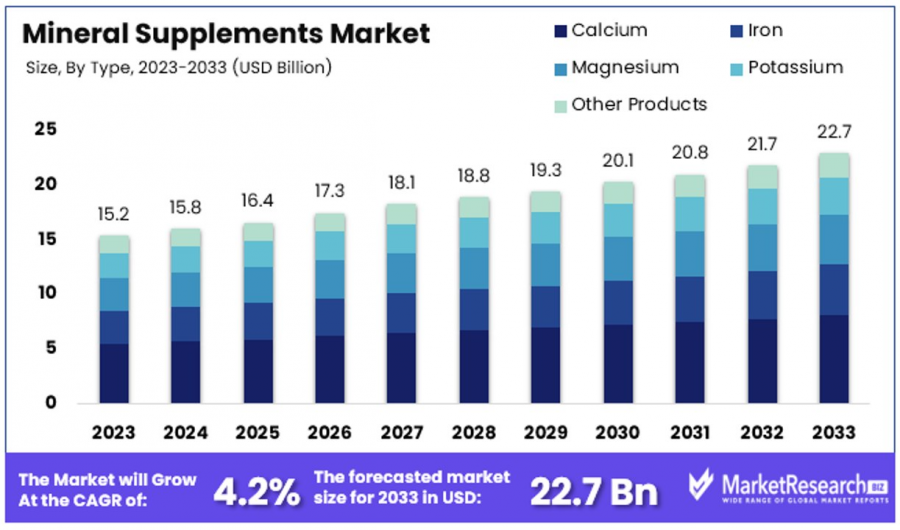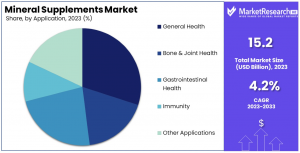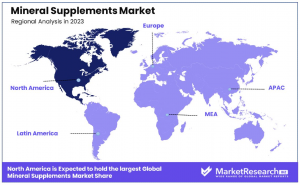
Mineral Supplements Market Expected to Achieve USD 22.7 Billion by 2033, Supported by Growing Health Consciousness
The Global Mineral Supplements Market size is expected to be worth around USD 22.7 Billion by 2033, from USD 15.2 Billion in 2023, growing at a CAGR of 4.20%
NEW YORK, NY, UNITED STATES, February 13, 2025 /EINPresswire.com/ -- Overview
The Global Mineral Supplements Market size is expected to be worth around USD 22.7 Billion by 2033, from USD 15.2 Billion in 2023, growing at a CAGR of 4.20% during the forecast period from 2024 to 2033.
The global demand for mineral supplements is rising as individuals seek to enhance their overall health, immunity, and nutrition. Mineral supplements play a vital role in supporting metabolic functions, bone health, muscle function, and immune responses, making them essential for people of all ages.
Common minerals found in supplements include calcium, magnesium, iron, zinc, and potassium, which help address nutritional deficiencies and prevent health complications. With changing dietary patterns and increased awareness of preventive healthcare, consumers are turning to high-quality mineral supplements to support their well-being.
The mineral supplements market is expanding, driven by technological advancements, personalized nutrition trends, and the rising demand for organic and plant-based formulations. Healthcare professionals increasingly recommend tailored mineral intake to meet individual dietary needs and lifestyle choices.
Regulatory bodies such as the FDA and WHO ensure that mineral supplements meet strict safety and quality standards, promoting consumer confidence in these essential health products. As interest in holistic health and wellness continues to grow, mineral supplements remain a key component in achieving optimal nutrition and long-term health benefits.
Click here to get a Sample report copy @ https://marketresearch.biz/report/mineral-supplements-market/request-sample/
Key Takeaways
•Market Growth: The global mineral supplements market is projected to grow from USD 15.2 billion in 2023 to USD 22.7 billion by 2033, expanding at a CAGR of 4.20% between 2024 and 2033.
•By Product: Calcium dominates with a 33.6% market share, reflecting its critical role in bone health and disease prevention.
•By Formulation: Capsules lead the market with a 41.2% share, driven by consumer preference for convenience and ease of use.
•By Application: General health supplements hold a 30.4% share, reflecting broad consumer awareness and a focus on overall well-being.
•By End-User: Adults are the largest consumer group, accounting for 36.8% of the market, fueled by higher health consciousness and purchasing power.
•By Sales Channel: Pharmacies & drug stores dominate with 50.6% share, offering trusted health advice and accessibility.
•By Region:
•North America leads with a 39.6% market share, driven by a strong focus on preventive healthcare and high supplement awareness.
•Analyst Insight: Rising health awareness, innovative product development, and targeted marketing strategies drive sustained market growth.
•Growth Opportunities: Increasing health consciousness and aging populations worldwide create opportunities for market expansion, particularly in niche product segments and enhanced distribution networks.
Segmentation Analysis
•Product Analysis: Calcium dominates the mineral supplements market, holding a 33.6% share with a CAGR of 3.8%. Its crucial role in bone health and osteoporosis prevention makes it widely used, particularly among aging populations and women. Other key minerals include iron for anemia prevention, magnesium for muscle function and sleep, and potassium for cardiovascular health. Additionally, zinc, selenium, and chromium are gaining attention for immune support and metabolic benefits, contributing to the segment’s steady growth.
•Formulation Analysis: Capsules lead the market, accounting for a 41.2% share with a 4.2% CAGR, driven by consumer preference for convenience, easy swallowing, and precise dosage control. Tablets remain popular due to their cost-effectiveness and long shelf life, while powders appeal to users mixing supplements with food or drinks. Other innovative formulations like gummies and effervescent tablets cater to younger demographics, making supplementation more enjoyable. Growing demand for enhanced bioavailability continues to shape this segment.
•Application Analysis: General health supplements dominate with a 30.4% market share and a 4.4% CAGR, reflecting widespread consumer awareness and demand for overall well-being. Other major applications include bone and joint health (calcium, magnesium), gastrointestinal health (magnesium), and immune support (zinc, selenium). Increased focus on preventive healthcare and personalized nutrition is driving growth in specialized formulations that target specific health concerns, expanding the market’s reach across various consumer needs.
•End-User Analysis: Adults are the largest consumer group, holding a 36.8% share with a 4.1% CAGR, driven by high health awareness and purchasing power. Other key segments include geriatrics (bone, joint, and cognitive health), pregnant women (fetal development support), and children/infants (growth and immunity enhancement). The growing demand for targeted supplements tailored to specific life stages ensures steady market expansion, with brands focusing on customized formulations for diverse consumer groups.
•Sales Channel Analysis: Pharmacies & drug stores dominate, holding a 50.6% share and a 4.2% CAGR, as consumers trust pharmacist recommendations and product accessibility. Supermarkets and hypermarkets attract buyers seeking competitive pricing and convenience, while online sales are growing rapidly due to e-commerce expansion, home delivery, and easy access to product reviews. The diversification of sales channels ensures broad market penetration, catering to evolving consumer shopping behaviors.
Market Segments
By Product
•Calcium
•Iron
•Magnesium
•Potassium
•Other Products
By Formulation
•Tablets
•Capsules
•Powders
•Other Formulations
By Application
•General Health
•Bone & Joint Health
•Gastrointestinal Health
•Immunity
•Other Applications
By End-User
•Adults
•Geriatric
•Pregnant Women
•Children
•Infants
By Sales Channel
•Pharmacies & Drug Stores
•Supermarkets & Hypermarkets
•Online Channels
To Purchase this Premium Report @ https://marketresearch.biz/purchase-report/?report_id=45196
Market Dynamics
•Driver: Rising Health Consciousness: Increasing public awareness of health and nutrition has led to a higher demand for mineral supplements. Individuals are proactively seeking ways to enhance their well-being, prevent deficiencies, and support overall health. This trend is evident in the growing consumption of dietary supplements aimed at improving energy levels and vitality.
•Trend: Surge During Health Crises: Health crises, such as the COVID-19 pandemic, have amplified the use of dietary supplements, including minerals, as individuals aim to boost their immune systems. Studies have reported significant increases in supplement consumption during such periods, reflecting a trend toward preventive health measures.
•Restraint: Regulatory Challenges: The mineral supplements market faces challenges due to varying global regulations. Inconsistent standards can lead to consumer confusion and pose barriers to market entry for manufacturers. Ensuring product safety and efficacy while navigating these complex regulatory landscapes remains a significant restraint.
•Opportunity: Aging Population: The global increase in the elderly population presents a substantial opportunity for the mineral supplements market. Older adults often require additional nutrients to maintain health, and supplements can help address these needs. Promoting responsible use of dietary supplements alongside a healthy diet can support nutrient adequacy in this demographic.
Market Key Players
•Amway India
•Nestlé Health Science
•Hainan Yangshengtang
•Abbott Laboratories
•Archer Daniels Midland Company
•Herbalife Nutrition Ltd.
•Webber Naturals
•Pharmavite LLC
•Glaxosmithkline PLC
•E. I. du Pont de Nemours
•Blackmores Limited
•Koninklijke DSM NV
Regional Analysis
North America holds a dominant 39.6% share in the global mineral supplements market, driven by high health awareness, disposable income, and a strong healthcare infrastructure. Consumers in the region actively invest in health products, including mineral supplements, to support preventive healthcare and overall well-being. Additionally, the aging population in the U.S., expected to double by 2060, fuels demand for supplements that aid in disease prevention and health maintenance.
A well-established wellness culture and the high prevalence of chronic diseases further contribute to market growth. Regulatory support for health claims on dietary supplements boosts consumer confidence, while strong retail and online distribution networks enhance accessibility.
North America is expected to maintain its leadership in the market, supported by continuous product innovation, strategic marketing, and increasing demand for personalized nutrition solutions. As companies integrate new technologies to tailor supplements to individual health needs, the region’s market influence is set to grow even further.
Emerging Trends in Mineral Supplements
•Personalized Nutrition: There's a growing trend toward tailoring mineral supplementation to individual health profiles. Advancements in genetic testing and personalized medicine enable consumers to choose supplements that address their specific nutritional deficiencies and health goals. This personalized approach enhances the effectiveness of supplementation and aligns with the broader movement toward individualized healthcare.
•Increased Focus on Immune Health: The COVID-19 pandemic has heightened awareness of the importance of a robust immune system. This has led to a surge in demand for mineral supplements like zinc and selenium, known for their immune-boosting properties. Consumers are proactively seeking these supplements to strengthen their immunity against infections.
•Sustainability and Ethical Sourcing: Modern consumers are increasingly concerned about the environmental impact and ethical considerations of their purchases. This trend extends to mineral supplements, with a rising demand for products sourced responsibly and produced sustainably. Brands that prioritize transparent sourcing and eco-friendly practices are gaining favor in the market.
Use Cases of Mineral Supplements
•Bone Health: Calcium supplements are widely used to support bone density and prevent osteoporosis, especially among postmenopausal women. According to the National Institutes of Health (NIH), adequate calcium intake is crucial for maintaining strong bones and reducing the risk of fractures.
•Anemia Prevention: Iron supplements are commonly prescribed to prevent or treat iron-deficiency anemia. The Centers for Disease Control and Prevention (CDC) reports that iron deficiency is a leading cause of anemia in the United States, particularly among women of childbearing age.
•Muscle Function and Sleep Quality: Magnesium plays a vital role in muscle relaxation and nerve function. Supplementation can help alleviate muscle cramps and improve sleep quality. The NIH notes that magnesium is involved in over 300 biochemical reactions in the body, underscoring its importance in maintaining overall health.
•Immune Support: Zinc supplements are utilized to enhance immune function. The NIH highlights that zinc is essential for immune cell development and function, and supplementation can reduce the duration of common cold symptoms.
•Prenatal Health: Folic acid, a B-vitamin, is recommended for pregnant women to prevent neural tube defects in developing fetuses. The U.S. Preventive Services Task Force advises that all women planning or capable of pregnancy take a daily supplement containing 400 to 800 micrograms of folic acid.
Lawrence John
Prudour
+91 91308 55334
Lawrence@prudour.com
Distribution channels: Healthcare & Pharmaceuticals Industry
Legal Disclaimer:
EIN Presswire provides this news content "as is" without warranty of any kind. We do not accept any responsibility or liability for the accuracy, content, images, videos, licenses, completeness, legality, or reliability of the information contained in this article. If you have any complaints or copyright issues related to this article, kindly contact the author above.
Submit your press release


